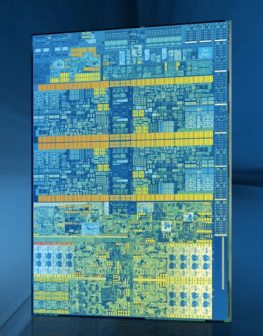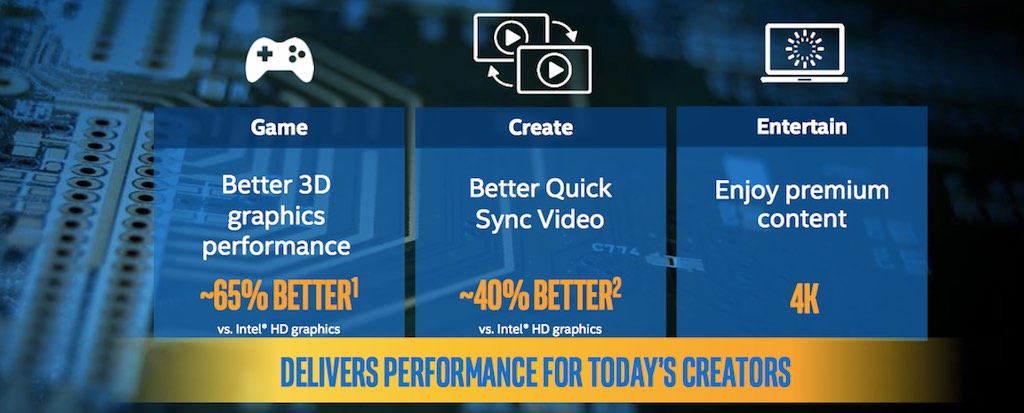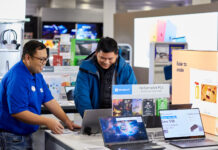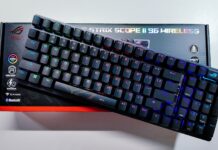Kaby Lake: Wait, Didn’t That Come Out Last August?
Intel’s product release schedule can be a little confusing. Although the company was onstage talking about its new Kaby Lake CPUs at CES 2017, it actually unveiled the 7th generation of its Intel Core CPUs back in August. Dual core mobile chips with Kaby Lake architecture started hitting the market late last year, but the big guns — the quad core CPUs used for desktop PCs and performance/gaming laptops — weren’t officially launched until January 3, at CES 2017.
So yes, you’ve heard about Kaby Lake before, but only a small subset of the chips had already been released.
 CES 2017 and Intel’s Kaby Lake Announcement
CES 2017 and Intel’s Kaby Lake Announcement
Intel took the CES stage to announce a 2017 series of more than 40 new, 7th generation Kaby Lake processors. There are multiple classes of chips released this year, including several that will be of particular interest to consumers. The U series is aimed at ultra-thin mobile computers, all-in-one PCs, convertible laptops and mini PCs. The S series will hit desktops, all-in-ones and mini PCs, while the H series will be powering the next generation of high performance gaming laptops (including VR-capable models) and PC workstations.
With the Kaby Lake dual-core chips released last year, there are now 67 CPUs available with the new Kaby Lake architecture. Gaming laptop manufacturers were showing off new models powered by 7th generation Intel CPUs at CES 2017. With the Kaby Lake chips now launched, we should start seeing computers featuring 7th generation processors in stores soon.
Why Should You Care About Kaby Lake?
Kaby Lake chips are built using the same 14nm process as last year’s Skylake chips, but Intel has revised the technology and calls it 14nm+ for Kaby Lake.
This is a new strategy employed by Intel where it is focusing on improving existing chip architecture to wring out new performance gains without having to dramatically re-design it every year and a half— as it has in the past. That may sound like Kaby Lake CPUs won’t have any real advantage over last year’s Skylake chips, but the new 7th generation processors actually deliver more than you might expect. They’re definitely more than a spec bump.
Here are some of the highlights of the Kaby Lake processors.
Graphics Improvements
Graphics were a big focus for Intel this generation.

The Kaby Lake CPUs include support for new 10-bit HVEC and 8/10-bit VP9 video codecs, along with HDR support and HDCP 2.2 compliance. That may sound like a lot of technical mumbo jumbo, but what it means is that many of the new Kaby Lake CPUs will be able to stream 4K video at high frame rates, in real time — including playback of streams from video services that use digital rights management. They also have the ability to play Ultra HD Blu-ray movies. 3D performance using integrated graphics is also much improved.
Higher Clock Speeds
Kaby Lake CPUs can be run at higher clock rates than their Skylake counterparts. Intel says the base clock rates can be higher, Turbo Boost rates can support 300-400 MHz higher peak clock speeds and Speed Shift will let Kaby Lake CPUs hit those peak clock rates faster than ever. Gaming PCs equipped with Kaby Lake CPUs have already set overclocking records.
Native Support for USB 3.1 and Thunderbolt 3
10Gbps instead of 5Gbps over USB? Yes please! Kaby Lake also includes support for Thunderbolt 3 (including over USB-C) for data transfer rates of up to 40Gbps.
Gen 3 PCIe, Native Support for Intel Optane SSDs
New Gen 3 PCIe storage is supported, which offers a considerable speed boost over PCIe 2 drives. Power users can look forward to native support for Intel Optane SSDs. They aren’t expected to arrive until later this year, but there’s a lot of buzz building over Intel’s new ultra high speed storage. Using new 3Dx storage technology, the Optane SSDs are claimed to be 10 times faster than current generation SSDs.
Better Battery Life
According to Intel, dedicated hardware acceleration and power efficiency improvements on the new Kaby Lake mobile chips will mean better battery life for laptops. In fact, it spiked out the U-Series chips (which will show up in 2-in-1 laptops and ultra-thin notebooks) as being able to provide 10 hours of battery life on a charge.
Security
Kaby Lake CPUs will include built-in hardware support for advanced security measures such as two factor authentication and payments using fingerprint authorization.
Windows 10
This one is more of a heads up than anything. Naturally, Intel and Microsoft say that computers with Kaby Lake CPUs will enjoy the best Windows 10 experience. That’s undoubtedly true. However, it’s also worth knowing that Microsoft has announced Windows 10 will be the only version of Windows supported on Kaby Lake CPUs.

Intel Kaby Lake CPUs: The Bottom Line
Does the introduction of 7th generation Kaby Lake CPUs mean it’s time to ditch your “old” computer with its Skylake chip? For most people, that wouldn’t make much sense. While more than an incremental upgrade, there’s not a huge performance leap. However, there are certain situations where the new chips do offer a significant performance boost. If you’re a PC gaming enthusiast—especially one who prefers to use a gaming laptop—the new quad-core Core i7 Kaby Lake chips are going to be tempting. Gamers may not care about the onboard integrated graphics acceleration (those machines will have discreet video cards doing the heavy lifting), but improvements like greater clock speeds, support for faster storage and improved mobile battery life will definitely give the new Kaby Lake-equipped gaming laptops an edge. Mac fans should also keep an eye out for refreshed iMacs. Apple’s all-in-one PCs last got an upgrade in late 2015, but with the new Kaby Lake chips finally here, a new iMac shouldn’t be far behind.
And if you have a PC that’s more than a few years old, you’ll definitely see a dramatic improvement by upgrading to one with a Kaby Lake CPU.
They may use the same basic architecture as Skylake, but Intel’s 7th generation Kaby Lake CPUs offer all around improvements as well as some all-new features. Look for Kaby Lake to start appearing soon in computers and laptops at Best Buy.




